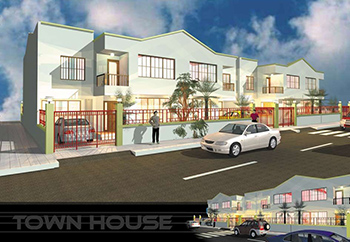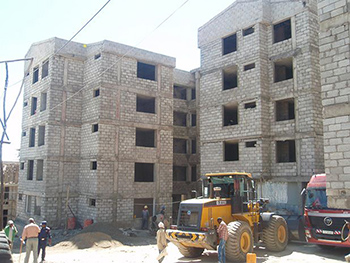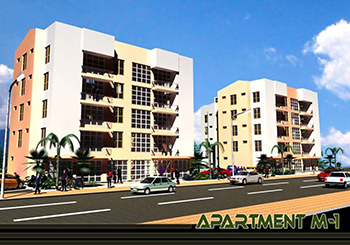Flintstone Engineering: 22 years of quality construction in Ethiopia
Tsedeke Yihune, Owner of Flintstone Engineering
Established in 1991, Flintstone Engineering has been in the business of engineering for construction for the last 22 years. 5 years ago the company moved into the real estate business. Flintstone Engineering’s revenue increased sevenfold over the last 5 years.
Interview with Tsedeke Yihune, Owner of Flintstone Engineering

Could you give us a brief history of Flintstone Engineering?
Flintstone has been in the business of engineering for construction for the last 22 years. We moved into real estate in the last five years and including the acquisition, maybe six years, but we have been actively involved in the real estate business for the last four and a half years.
What is your overview of the construction sector in Ethiopia and your outlook for 2014 and onward?
When I started Flintstone in 1991, there was a change of government in Ethiopia from a military government and it was a whole different market for construction. First of all, federalism came into place and the constitution was a republic – it turned into a federal republic. Because of the decentralization of power, there was so much to build – roads, buildings – and because of that, there was a construction boom.
 Even the government budget expanded from around two billion Ethiopian birr at the time which would be around one billion US dollars into three or four billion dollars in the space of 15 or 16 years. Together with that came the millennium development goal, which was reducing poverty by 50% and increasing access to education and water to nearly everyone. That also required large government construction projects and because of that, the construction business was expanding continuously and it is still expanding up until this time, although not so much in real estate.
Even the government budget expanded from around two billion Ethiopian birr at the time which would be around one billion US dollars into three or four billion dollars in the space of 15 or 16 years. Together with that came the millennium development goal, which was reducing poverty by 50% and increasing access to education and water to nearly everyone. That also required large government construction projects and because of that, the construction business was expanding continuously and it is still expanding up until this time, although not so much in real estate.
What is the core business of Flintstone Engineering and how do you stay ahead of the competition?
In Ethiopia, really, in construction all you have to do is survive because of an expansionary economic policy. If you survive, and by survive I mean if you deliver on time and deliver well within the bounds of your bidding strategy, you are certainly going to be profitable. In that sense, we have concentrated on high labor productivity and quality workmanship and have survived for 22 years. Our revenue over the last five years has increased sevenfold. Our core business is in delivering quality jobs on time to the public.
You have grown to be one of the largest, most successful construction companies in Ethiopia. How has your expansion into water and roads progressed so far?
In construction all you have to do is survive because of an expansionary economic policy in Ethiopia. If you survive, if you deliver on time and deliver well within the bounds of your bidding strategy, you are certainly going to be profitable. In that sense, we have concentrated on high labor productivity and quality workmanship and have survived for 22 years. Our revenue over the last five years has increased sevenfold.
Currently, 80% of our revenue is generated from building construction and the remaining 20% is split between water and roads. We have been concentrated on buildings; that is on purpose. Roads as a construction business, especially in a country that is fast-growing like Ethiopia, can level off when it comes to infrastructure in roads and water. Once water infrastructure works have been more or less distributed within the nation, the kind of business that rests with roads and water is likely to level off.
But when it comes to buildings, that’s a different story. With increased income, construction in housing usually expands in a cyclic/spiral way. Even in structural terms, when the employment structure of an economy gradually changes from a rural economy into an urban economy, the possibilities of the business in housing are unlimited. In that sense, we have always tuned our construction business to focus on buildings and actually we have become well-known throughout the country as well as abroad once we moved into the real estate business. This is because by its nature, real estate requires a lot of promotion. You have to target the buyers as well as access to land; I believe that the future is in housing construction.
Is Flintstone Engineering involved in the Grand Ethiopian Renaissance Dam project?
No we are not, except in buying Renaissance bonds. The government issues Renaissance bonds which are really government bonds with 5 to 6% interest rates and the government strongly promotes the purchase of such bonds to finance the Renaissance Dam, so in that sense we are involved.
What rate of growth have you achieved in the past few years and do you see that trend continuing?
 Actually, I have to answer that frankly. The housing market, or any kind of construction business really, in an economy, needs to be leveraged by a good increase in the national median income otherwise it is going to level off somewhere, especially in housing. Despite this, we have sold about 1,200 residential units in the last four and a half years. I still fear that this will not continue unless the rural economy is somehow restructured into becoming an urban economy and that we gear our effort into urbanizing our economy.
Actually, I have to answer that frankly. The housing market, or any kind of construction business really, in an economy, needs to be leveraged by a good increase in the national median income otherwise it is going to level off somewhere, especially in housing. Despite this, we have sold about 1,200 residential units in the last four and a half years. I still fear that this will not continue unless the rural economy is somehow restructured into becoming an urban economy and that we gear our effort into urbanizing our economy.
You had a five year plan back in 2007 which was to achieve 300 million birr revenue by 2011. Did you accomplish that?
Yes, although if we adjust that to 2007 prices, I think we are short of the target by about 30%. But with the inflated prices, we have now achieved the 500 million mark in 2011/2012. We repeated that income again this year with less inflation, so I would say we have reached that goal albeit a year later.
Being one of only eight construction companies here in Ethiopia that are certified ISO 9001, does that really guarantee a lot of contracts from the government?
I’m not sure we are the only eight anymore. We used to be that a few years ago but I’m not sure that is the case anymore. I have to validate that with the ISO office. That information on our website is three or four years old so other companies might have come in but given that the fight for ISO has dwindled over the years, maybe we are still the same. A few years ago, the government had the idea to make ISO a necessary qualification for government contracts, but the real benefit of being in an ISO quality management system comes from integrating all activities into achieving the set goals. The very idea of setting goals in strategic terms instead of annual operation plans is important.  We really internalized that kind of thing once we were ISO certified or when we were trying to become ISO certified. The benefits we derive from that process are much greater than any kind of marketing validation that we get from the ISO name.
We really internalized that kind of thing once we were ISO certified or when we were trying to become ISO certified. The benefits we derive from that process are much greater than any kind of marketing validation that we get from the ISO name.
What are some challenges that face Flintstone?
Again I would say the main challenge is we are in the housing business and people have to pay for houses from their savings. It is very necessary that the income of the general population increases while their consumption or expenditure is maintained at the same level or the trajectories of the income and the expenditures are divergent in a positive way. That’s the only way that we can supply residential homes or a retail space or a commercial space for manufacturing. Any kind of real estate ideas that we might come up with can only be sold to the public at large if we work on increasing the average income of the population. For that, the main thing is we have to work on how to give good prices for the rural products of the rural population or give low-priced products to the rural households who are engaged in farming activities.
We are doing research now in using urban design and how we can increase the income level of the urban population as well as increase or restructure the economic makeup of the rural communities. In that sense, the research actually focuses on urban designs for small towns where we are trying to house rural households from their cottage – to lure them from their homestead cottage which are very much dispersed, and become concentrated in a rural-urban center. We can achieve that kind of design which would be practical and practically transform rural households into urban households. At the extreme remote level, we can do that.
And at the same time we can also increase the productivity of the urban population using urban design.
If you went through the Addis neighborhoods, most of the neighborhoods are not properly designed. There are quarters that have been there for 40 years in the most dilapidated condition. The national average of slum coverage is around 40% and the Addis slum percentage is 60%; the government has a target of reducing that by half. The only way that the government can achieve that is if they get involved with the private sector in a real estate public-private-partnership (PPP) and engage the people and the private sector developers from abroad or locally. We need to inject capital as well as know-how in urban design and reconfigure neighborhoods so that they can build more productive households which would translate into higher income and again, business for our housing market.
What is your vision for Flintstone for the next five years?
Four years ago, we had an eight year target of selling 5,000 units by the end of the eighth year, by 2017. Now we are around 3,800 units short of that and it’s very unlikely that we are going to achieve that unless, as I say, we increase the median income. We need to do something about the median income of the urban population. If we are successful over the next two or three years to work with the government in changing this, I think we can double that target by 2017. We might be able to achieve 10,000 units sold by 2017.
FAIR USE POLICY
This material (including media content) may not be published, broadcasted, rewritten, or redistributed. However, linking directly to the page (including the source, i.e. Marcopolis.net) is permitted and encouraged.